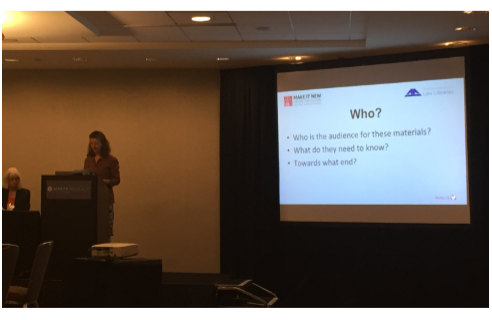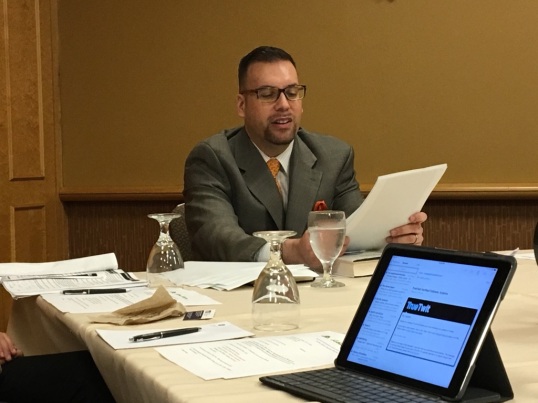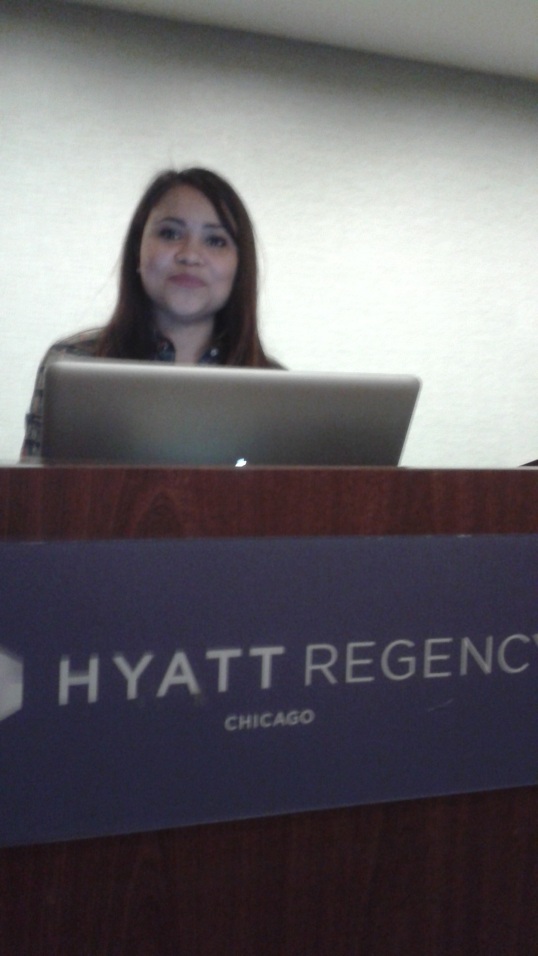By: Jennifer Allison
Although the title of this program promised content about Roman Law, this program actually was a bit more focused on digitization of library materials, especially materials and collections that are unique and important to researchers. For both presenters, preserving materials is only one of several goals of library digitization projects. Both had found that, perhaps, a more important goal is fostering and optimizing the connection between people and materials.

Marylin Raisch, a long-time member of the FCIL-SIS, served as moderator and employed a question-and-answer format for Professor Kearley’s discussion, which was both highly effective and quite enjoyable.
Marylin’s knowledge of many topics, including Roman law and U.S. legal history, is quite extensive, and she probably could have offered an informative and interesting program on this topic all on her own. However, she really allowed Professor Kearley’s knowledge, expertise, and passion for the subject to shine through.
Beginning around 1920, Wyoming Supreme Court Justice Fred Blume, an expert in Roman Law, began work on his English-language annotated translation of the Codex of Justinian. Transcripts representing various stages and versions of this translation are in Justice Blume’s papers, which are held by the University of Wyoming Law Library. Professor Kearney oversaw and edited the digitization and publication of this manuscript collection, both editions of which are hosted on the University of Wyoming Law Library’s website.
Justice Blume’s personal history, as described by Professor Kearley, provided some fascinating background on his translation projects. Justice Blume, who immigrated to the United States at age 12, learned Latin in high school and ended up graduating Phi Beta Kappa with a BS in philosophy. While he did not have formal legal training, he read law in a law office, eventually becoming a lawyer, judge, and politician in Wyoming.
Throughout his life he had a deep interest in Roman legal materials, and decided to translate ancient Roman legal codes after he tried to order English translations of them from book publishers and was told there were none available.
Justice Blume was, as Professor Kearney explained, not alone in the American legal community when it came to his interest in Roman law. During the early 19th century, many U.S. legal scholars studied Roman legal materials as a part of a larger movement toward exploring the codification of U.S. law. Although that movement had receded by the end of the civil war, there was a renewed interest in using a Roman or civil law taxonomy as a means of classifying the law in the early 20th century, especially as it related to the American Law Institute’s project on legal restatements.

As Professor Kearney pointed out, the early 20th century saw a “Jacksonian” anti-elitist movement similar to that which is taking place today. To that end, Justice Blume took care to not discuss Roman law on the bench when he served as a justice on the Wyoming Supreme Court. However, as Professor Kearney mentioned, among lawyers of a certain sensibility during that time, the language of Latin and Roman law served as an “old-school tie they waved at each other.”
Professor Kearney concluded by discussing the decision he made to include versions of Justice Blume’s work in manuscript form, which includes marginalia and other notes that make it hard to read, in the digital archive. The advantage of including this as well is to create a real connection between the work and the researcher.
This conclusion created a nice tie-in to Angela T. Spinazzè’s presentation, in which she provided a more general discussion of establishing and managing digitization and digital archives projects. Ms. Spinazzè focuses on three categories of questions: who, what, and how.

- First, in response to “who,” she considers who the intended audience is, which focuses the work and allows for coalescing around a shared conclusion. This also helps illuminate biases and assumptions.
- Next, she thinks about the question of “what.” This means considering what the digitization project is intended to accomplish, and what the consequences would be of not digitizing the materials.
- Finally, the “how” question focuses really on the materials themselves: how should what you are digitizing be presented to target audiences, and, perhaps unexpectedly, how will the digitization project advance the purpose of the organization? Can it, for example, foster greater collaboration across more institutional departments? Is a natural outcome of the work the identification of more shared activities across the organization?
Ms. Spinazzè then provided two examples of digitization projects, the Oriental Institute at the University of Chicago, and the HEIR (Historic Environment Image Resource) at the University of Oxford. Both of these projects provided unique and illuminating answers to the questions of who, what, and how that really illustrated the effectiveness of the methodology.
The Oxford project sounded particularly interesting. It saved from destruction a collection of lantern slides and glass plate negatives that had been abandoned in an archive. As it turned out, in addition to saving the original materials, the digital library also provided a wiki-like forum in which researchers and scholars could tag the images (using a controlled vocabulary) and provide new content of the scenes as they had been re-photographed over time.
Overall, although the program was not exclusively about Roman law, it provided a thoughtful forum for contemplating the values of digital collections, and provided insight into how the audience could consider undertaking similar projects at their home libraries.

 Jim is the Senior Reference Librarian with the Robert S. Marx Law Library at the University of Cincinnati Law School
Jim is the Senior Reference Librarian with the Robert S. Marx Law Library at the University of Cincinnati Law School Timothy Kearley was the Director of the Law Library and Centennial Distinguished Professor of Law, University of Wyoming. Before coming to the University of Wyoming, he was the FCIL Librarian and Associate Director of the Law Library at the University of Illinois College of Law and then Director of the Law Library and Professor of Law at Louisiana State University Law Center. Professor Kearley was instrumental in creating the FCIL-SIS and served as its Chair in 1989/90.
Timothy Kearley was the Director of the Law Library and Centennial Distinguished Professor of Law, University of Wyoming. Before coming to the University of Wyoming, he was the FCIL Librarian and Associate Director of the Law Library at the University of Illinois College of Law and then Director of the Law Library and Professor of Law at Louisiana State University Law Center. Professor Kearley was instrumental in creating the FCIL-SIS and served as its Chair in 1989/90. Each year the FCIL-SIS is proud to recognize its colleagues for their contributions to our profession. First, during our annual business meeting, one of our all-stars – Dan Wade – bestows the Newest FCIL Librarian Award on the ‘newest’ FCIL librarian member among us. This year, we are happy to recognize and welcome
Each year the FCIL-SIS is proud to recognize its colleagues for their contributions to our profession. First, during our annual business meeting, one of our all-stars – Dan Wade – bestows the Newest FCIL Librarian Award on the ‘newest’ FCIL librarian member among us. This year, we are happy to recognize and welcome  Sherry Leysen
Sherry Leysen Evelyn Ma
Evelyn Ma Alyson Drake
Alyson Drake Dr. Rheny Pulungan
Dr. Rheny Pulungan After Dr. Pulungan’s excellent talk,
After Dr. Pulungan’s excellent talk, Spearheaded by Dan Wade of the Yale Law School Library, the FCIL-SIS Book Group met again this year at the AALL annual meeting. Of the two finalists, the book chosen by the participants was
Spearheaded by Dan Wade of the Yale Law School Library, the FCIL-SIS Book Group met again this year at the AALL annual meeting. Of the two finalists, the book chosen by the participants was 

 Alex Zhang was the coordinator, moderator, and introductory speaker. She started by stressing the importance of good, reliable translations, but noted that even “official” translations by government entities are still for informational purposes only. In presenting the portion of the program on finding primary law of China, she included:
Alex Zhang was the coordinator, moderator, and introductory speaker. She started by stressing the importance of good, reliable translations, but noted that even “official” translations by government entities are still for informational purposes only. In presenting the portion of the program on finding primary law of China, she included: Anne Mostad-Jensen presented on law of Hong Kong and Macau. For these jurisdictions, she stressed that it is particularly important to understand their histories. Because of Hong Kong’s history as a British colony, it has a hybrid system of common and civil law, and English is one of its official languages for legal publication. Sources for Hong Kong legal information in English include:
Anne Mostad-Jensen presented on law of Hong Kong and Macau. For these jurisdictions, she stressed that it is particularly important to understand their histories. Because of Hong Kong’s history as a British colony, it has a hybrid system of common and civil law, and English is one of its official languages for legal publication. Sources for Hong Kong legal information in English include: Jootaek “Juice” Lee demonstrated resources on law of the Republic of Korea in English. Although South Korea has a civil law system, it has been influenced by U.S. common law. English translations are not official, but English is widely used, and there are English language versions of most government websites. However, terminology can be an issue because of differences in civil and common law. Most primary sources are available in English, and government publishers try to provide accurate translations. Juice warned that Korean law changes rapidly, and English translations may not keep up. There are also issues with understanding the differences between public, private, and social law. He recommended sources including:
Jootaek “Juice” Lee demonstrated resources on law of the Republic of Korea in English. Although South Korea has a civil law system, it has been influenced by U.S. common law. English translations are not official, but English is widely used, and there are English language versions of most government websites. However, terminology can be an issue because of differences in civil and common law. Most primary sources are available in English, and government publishers try to provide accurate translations. Juice warned that Korean law changes rapidly, and English translations may not keep up. There are also issues with understanding the differences between public, private, and social law. He recommended sources including: Mike McArthur had the final presentation in the program on finding Japanese law in English. Japanese efforts to be more international led to a 2004 Japanese law requiring translation of Japanese laws. Laws are first made available in tentative translation before an “official” version is available. Of course, translations are still unofficial. Mike warned that the Japanese calendar has a different date system, so he provided a “cheat sheet” for Japanese dates. Sources for Japanese law in English include:
Mike McArthur had the final presentation in the program on finding Japanese law in English. Japanese efforts to be more international led to a 2004 Japanese law requiring translation of Japanese laws. Laws are first made available in tentative translation before an “official” version is available. Of course, translations are still unofficial. Mike warned that the Japanese calendar has a different date system, so he provided a “cheat sheet” for Japanese dates. Sources for Japanese law in English include: